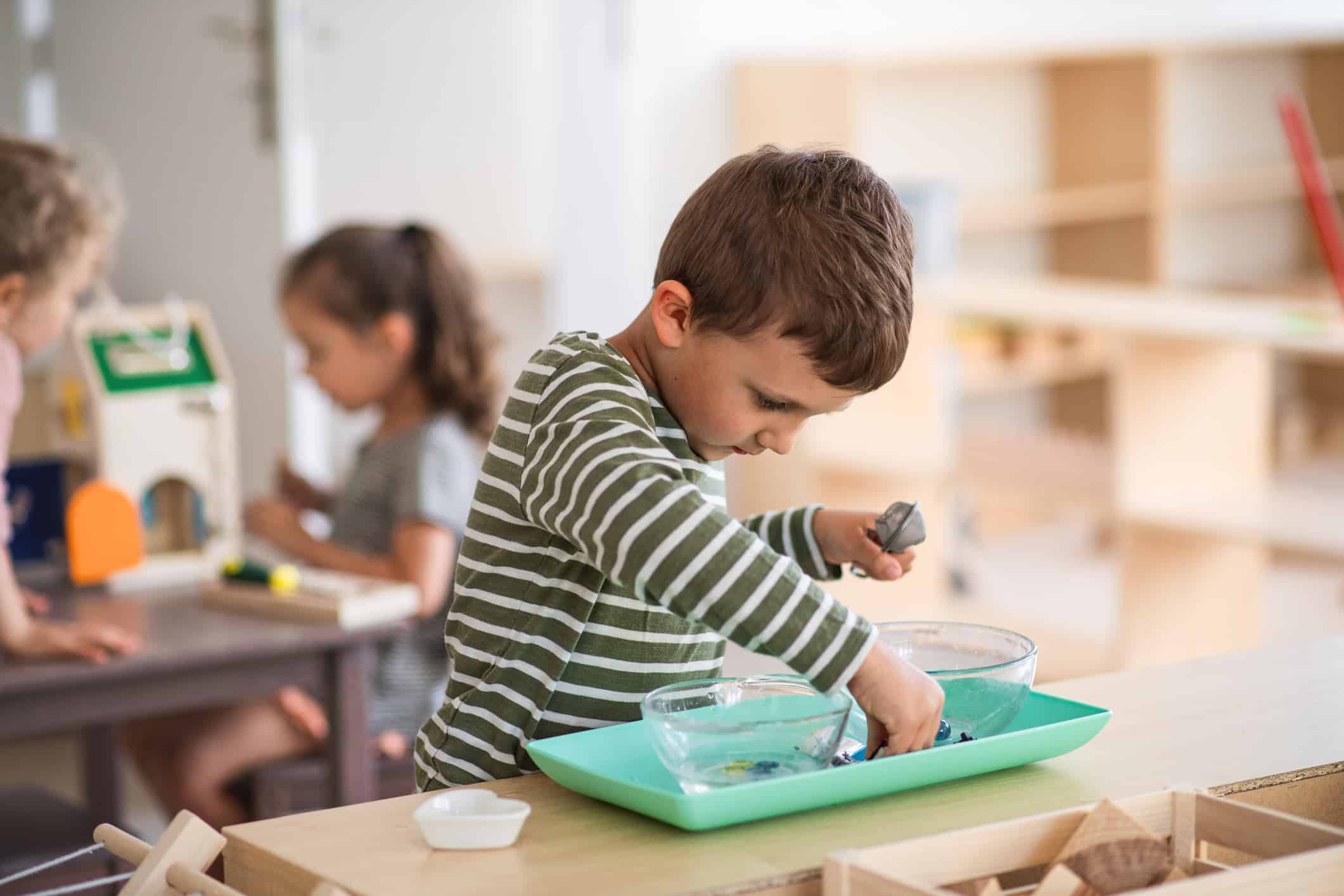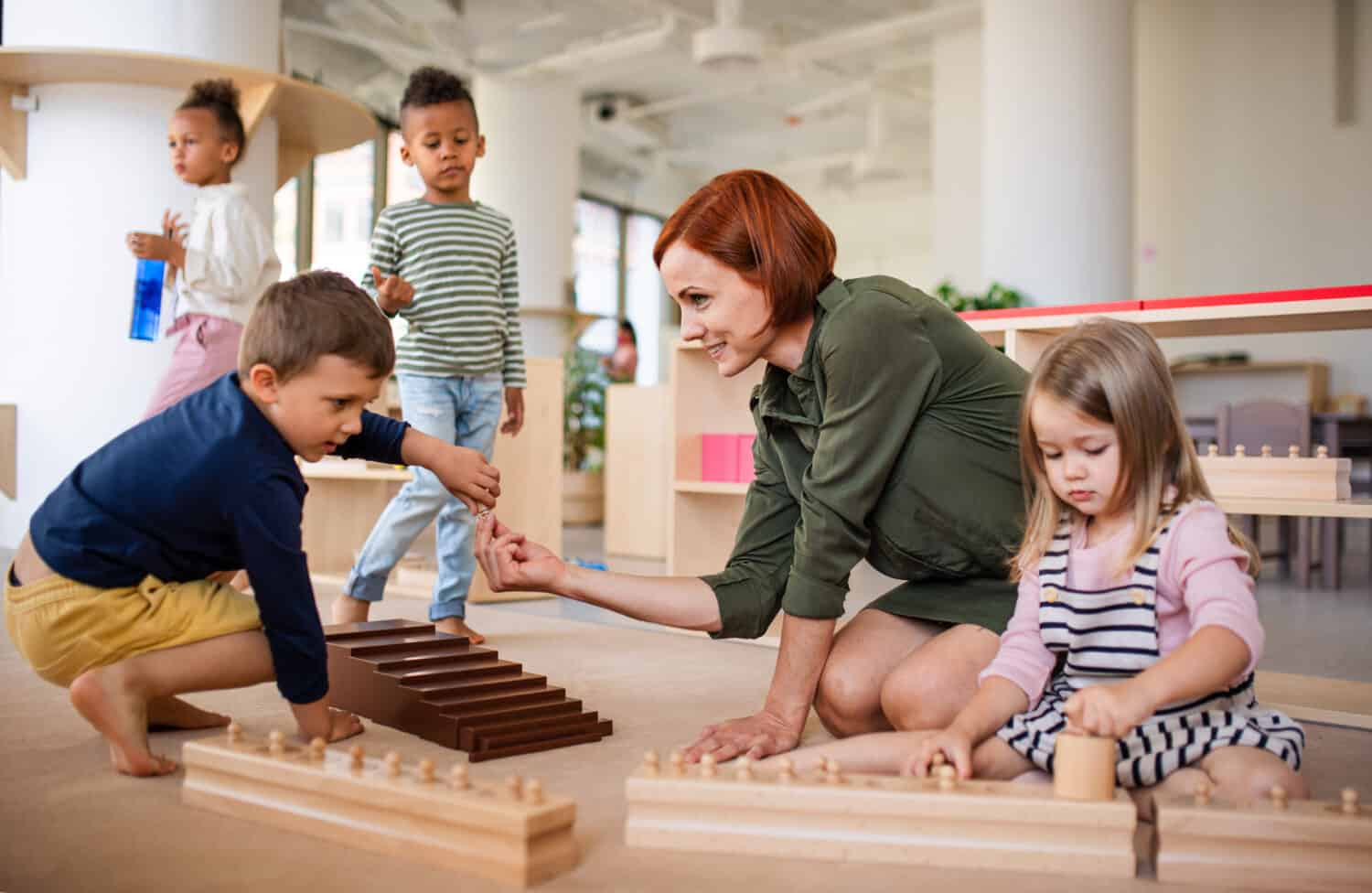As a parent of school-age children, choosing a school for your child is one of the most difficult decisions. From private schools to public schools, there are numerous options out there no matter where you live. If you’re considering a Montessori school, you may wonder about the benefits of a Montessori education.
No educational method is one-size-fits-all, but there are many benefits of a Montessori education for children with various learning styles. Some of the benefits include children gaining independence, self-discipline, and the ability to self-correct. In a Montessori environment, children are valued for who they are, not what they can produce.
If looking into a Montessori school for your child or are curious about what Montessori education has to offer, keep reading for the nine benefits of a Montessori education.

©iStock.com/monkeybusinessimages
What Is Montessori Education?
Back in the early 1900s, an Italian physician and educator named Dr. Maria Montessori developed the method we now know as Montessori. Through her observations, Dr. Montessori noticed children’s natural curiosity, creativity, and love for learning. She saw that children thrived when encouraged to explore and discover materials independently and at their own pace.
Dr. Montessori used her research and observations to create the Montessori method, a child-centered approach where children can engage in real-world, practical activities. Let’s look at what distinguishes a Montessori education from a traditional education.
Montessori Education vs. Traditional Education
When comparing Montessori education to traditional education, it’s not just the look of the classroom that differs. Traditional education methods are teacher-centered and students usually learn through lectures or direct instruction. In this method of education, children may sometimes learn with the whole class or within small groups.
In a Montessori environment, the classroom is student-led and centered. The teachers are seen as guides or facilitators who point children in the right direction while they’re learning. Even from a young age, children are encouraged to explore, discover, and engage with classroom materials independently. It’s through this exploration that young children learn to self-correct and develop problem-solving skills.
Both the prepared classroom environment and the philosophy behind the Montessori method lead to the many benefits of this type of education.
9 Benefits of a Montessori Education
There’s no doubt that a well-prepared Montessori classroom is a beautiful place for children to learn. But Montessori education has more to offer than aesthetic learning materials. Throughout the history of Montessori education, teachers and parents have seen children benefit in the following ways.
Children Are Valued
As parents, everything we do stems from the love we have for our children. When children are in a public school environment with large class sizes, it can often feel like they become lost in the crowd. Between grades and standardized testing, there is a significant focus on what students can produce.
In a Montessori environment, children are valued for who they are, not what they can accomplish. Montessori schools focus on teaching and loving the whole child- caring for their social and emotional needs as well as their academic ones.
Individual Approach to Education
Traditional schools often expect children to fit a one-size-fits-all approach. While no educational method is necessarily the right fit for every child, Montessori education focuses on individualized learning to meet the needs of each student.
Since children spend a significant portion of their day participating in uninterrupted play or independent learning, they can learn at their own pace and in a way that feels natural to them. This also allows the teachers, or guides, to help each child individually, instead of teaching all the students at once.
Gain Independence
One of the largest benefits of Montessori education is how quickly children learn to be independent. Children in a Montessori environment still receive instruction in small groups or individually from a teacher. However, they also have the freedom to choose an activity and move around the classroom.
Many aspects of the Montessori curriculum are self-directed to allow students to teach themselves, fostering their natural curiosity and independence. Even from a young age, Montessori students gain independence from practical activities such as feeding themselves or cleaning up after themselves at the end of the day.

©iStock.com/Halfpoint
Hands-On Learning
Montessori education focuses on hands-on learning and teaching practical life skills. The hands-on approach is a way for children to learn through experience. In traditional education, children spend a lot of time sitting at a desk while they learn. However, in Montessori schools, children can explore, discover new things and learn with each of their senses.
The prepared Montessori environment allows students to explore and engage with the classroom materials. They often spend a portion of the day outside, exploring nature and learning about the world through experience.
Children Learn Social and Behavioral Skills
With so much emphasis on independent learning, you may wonder if children develop proper social skills in Montessori education. One of the benefits of a Montessori education is this method helps children excel socially and behaviorally since they are able to solve issues with other students through problem-solving.
Montessori education leads to positive interactions with other students and prioritizes helping students develop the skills they need to become compassionate citizens. Dr. Montessori believed that children should learn social behaviors through “grace and courtesy” exercises. These exercises allow children to learn appropriate social behavior and practice treating one another with respect.
Become Part of a Community
Community is such an important part of Montessori education and what it hopes to accomplish. The community within a Montessori school isn’t just within the classroom environment. The Montessori method encourages students and families to be a part of the entire school community and their local community as well.
Part of the goal of a Montessori education is to help children become independent and responsible citizens in the larger community they’ll eventually become a part of in the world. Dr. Montessori’s method included peace education since she hoped to help students become ethical and socially conscious through her educational philosophy.
Love of Learning
When Dr. Montessori opened her first Children’s House, she observed that children naturally love to learn. If you can foster their natural curiosity at a young age, children will become lifelong learners.
Children may lose their love of learning in more traditional schools, where instead of exploring and engaging with the learning materials, they only learn from direct instruction. The absence of formal grades in a Montessori environment places the value on mastering a skill, instead of passing a test.
Freedom Within Limits
Even though there is a Montessori classroom does have structure, children are able to explore and discover in their own way. They can move around, engage their five senses, and even explore nature throughout the day.
Students have freedom in a Montessori classroom but within the structured limits of the environment. This allows children to explore at their own pace in a safe environment, where there are limits to what they can do and accomplish. All of the materials in an authentic Montessori classroom also allow children to self-correct and learn problem-solving skills.
Creativity
Creative thinking is such an important part of learning and plays a critical role in a child’s development. In a Montessori setting, educators nurture creative thinking in their students. Whether this is through exploration of the classroom environment, interacting with students of different ages, or searching for answers independently, the Montessori environment fosters children’s natural creativity.
The independence, autonomy, and freedom students have in a Montessori classroom contribute to the development of their creative skills and promote creativity, even from a young age.
Criticisms of Montessori Education
Like any method of education, Montessori has not been without criticism. One of the major criticisms of Montessori education is the lack of accessibility, especially for lower-income families. Considering the many benefits, there are families who would love to send their child to a Montessori school. However, Montessori private schools typically cost between $5,000 and $15,000 a year, depending on the location and type of programs offered.
At this cost, this type of education isn’t accessible to everyone. One counterpoint to this criticism is the number of Montessori public schools available. In the U.S., there are over 500 public Montessori programs.
There are also criticisms about the lack of grades and rewards in Montessori education. While this is to help children focus on learning and development, not extrinsic motivation, it may not be the best fit for every child. However, these criticisms don't negate the benefits of a Montessori education.
How to Find a Montessori School Near You
There are numerous benefits to Montessori education. Montessori schools are available all over the country and they continue to be a strong force in the world of education. If you’re looking for a Montessori school near you, you can search for schools in your area based on accreditation. For example, if you’re looking for a school affiliated with the American Montessori Society, they offer a tool to search for schools by location. You can also check out our top picks for Montessori schools in areas such as San Francisco, Austin, or Denver.
The image featured at the top of this post is ©Ground Picture/Shutterstock.com.
